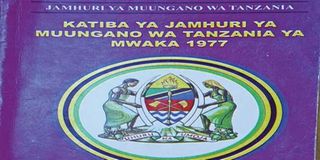TALKING POINT : What should be done to restart stalled Katiba review

What you need to know:
- I have learnt that there are many ways through which constitution processes can be put in motion in a particular country.
I was lucky enough to benefit from the wisdom of colleagues in constitutional law while taking part in a constitution-building programme in Budapest, Hungary, earlier this month.
I have learnt that there are many ways through which constitution processes can be put in motion in a particular country.
Looking at Tanzania, I am of the view that we made a wrong start in 2011. We should have based the process on Article 98 of the Constitution of the United Republic of Tanzania, 1977, which provides for the procedure as to how the constitution can be changed or replaced.
This is the procedure set out in Article 98 (1), and is required to garner the support of at least two thirds of all members of Parliament. The fact that the review process would have change the supreme law profoundly and thus have implications on both the Zanzibar constitution and Union matters was also supposed to have been taken into consideration.
In this case, the Second List of the Second Schedule in the Constitution of Tanzania should have applied. According to the text of that schedule, which is part of the text of the Constitution, there are eight matters upon which alteration shall require the support of two-thirds of all the Mainland MPs as well as two-thirds of MPs from Zanzibar, separately considered.
This procedure is a constitutional requirement to ensure that both sides of the Union can fully participate in deciding major issues of the Union. These issues include the existence of the United Republic of Tanzania; the existence of the office of the President of Tanzania; the authority of the Government of Tanzania; the existence of the Parliament of Tanzania; the authority of the Government of Zanzibar; the High Court of Zanzibar; any matter in the list of Union matters and the number of MPs from Zanzibar.
The process, which kicked off in January 2011, was going to significantly touch on nearly all issues listed above. The trillion-shilling question here is: why then did we opt not to follow these important clauses in our own Constitution?
Is it surprising that the process was fiercely opposed by Tanzanians who benefit from the status quo? Ministers came out to the open to oppose the process, not to mention CCM apparatchiks who claimed that the decision was never passed by party organs.
This all would have been solved had we, as a nation decided, to abide by the requirements of the Constitution. Unfortunately, we got carried away by the prospect of having a new and progressive constitution within a few years that we ignored these fundamental requirements.
It may sound as though it is too late to raise these issues, but the fact remains that these questions are key now as Tanzania ponders on the best way of going back to the process. As it may be known by now, some circles are calling for the restart of the process from scratch, while others are divided between starting from where the Warioba commission ended and going to a referendum as the next step.
I have led an organisation whose position is that we convene a committee of experts comprising nine members, two of which should be non-Tanzanians, to be tasked with harmonising two drafts, namely the second draft put together by the Constitutional Review Commission in December 2013 and the Proposed Constitution passed by a divided Constituent Assembly in September 2014.
The biggest lesson from what other countries have done to prepare their constitutions is that the process must start with the highest levels of inclusion and participation and proceed that way to completion.
The President should announce the date on which the process will restart. This should be followed by the appointment of a committee of experts (CoE), which, after parliamentary approval and gazettement, shall be tasked with harmonising the two drafts in line with the principles of international human rights law and constitutional democracy within 60 to 70 days.
After the production of one final draft, I suggest that it be subjected to legislative approval in both Tanzania Mainland and Zanzibar before Tanzanians are allowed to have their say in a referendum. All this should preferably be done before the end of 2018 given that local government elections are scheduled for 2019 and the next General Election being slated for 2020.




